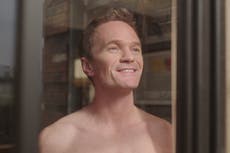The Sandman review: Neither dream nor nightmare – more of a vague reverie
The Neil Gaiman comic-book adaptation finally arrives on Netflix after years in development hell
Television viewers, alienated in the past decade from multiplexes by the overwhelming dominance of the comic-book movie, have long sought refuge in the intelligent programming offered by the small screen. But as the years have crept on, the dream of “Peak TV” has been invaded by heroes and villains, sci-fi and fantasy. Now, in 2022, every other big new TV show seems to be a comic-book adaptation, desperately trying to ferry viewers over from cinemas like Charon on the River Styx. The latest in this trend is DC’s mega-budget collaboration with Netflix to adapt The Sandman, after 30 years stuck, fittingly, in development hell.
At its heart is Tom Sturridge’s gravel-voiced emo, Dream, the king of dreams and nightmares, who is accidentally imprisoned by an occultist (Charles Dance, of course) for a century. During this time, the fabric binding the waking and sleeping worlds begins to fray. “When the waking world leaves you wanting and weary,” Dream informs us of his realm, The Dreaming, “sleep brings you here to find freedom and adventure.” Standing in the way of him rebuilding his kingdom are Ethel Cripps (Joely Richardson) and her son John Dee (David Thewlis – yes, that age difference makes sense by the show’s logic) who have traded away or hidden Dream’s “tools”. That’s not to mention the rogue nightmare, Corinthian (Boyd Holbrook) who’s enjoying his new freedoms. “I’m not gonna stop until I’ve reshaped this world to look just like me,” Corinthian announces, but Holbrook is so chiselled that the “world” can have few complaints.
For better or worse (and let’s face it, it’s for worse) The Sandman is aimed squarely at comic-book fans. Thewlis, superbly sympathetic as the fragile John Dee, will become Doctor Destiny – a sort of less evil Freddy Krueger – who has gone on to fight Superman and Batman in other threads of the DC comics world. The Sandman was created, in 1989, by Neil Gaiman, the British writer whose work has been undergoing a flurry of adaptation lately: the acclaimed American Gods has run for three seasons, while the smug but palatable Good Omens will shortly return for its second outing. Indeed, even the world of The Sandman has been on our screens before, in the form of Lucifer, starring Tom Ellis as the reluctant devil (a role here played, rather hammily, by another Game of Thrones alumnus, Gwendoline Christie). But with a rumoured $165m budget spent on The Sandman, Netflix is gambling that Gaiman’s work catches fire like never before.
Like many of Gaiman’s creations, The Sandman has a picaresque quality, as Dream quests through the sleeping and waking domains. Characters come and go – don’t get too attached to, say, Jenna Coleman’s Johanna Constantine, though perhaps she’s waltzing into a spin-off – with only the central players staying the course. The mixture, too, of different mythologies (Ancient Greece’s Fates are represented, as are the Bible’s worst siblings, Cain and Abel, portrayed by Sanjeev Bhaskar and Asim Chaudhry) is typically Gaiman. There’s also that trademark goofy humour (“Who do I invoice for this, the Church of England or Buckingham Palace?” Johanna asks after a troublesome royal exorcism) that some will find terribly clever, others terribly grating.
For comic-book fans, The Sandman is held up as more erudite, creative material than, for example, the Marvel Cinematic Universe (though that is rather like being the henchest toddler at preschool). But at this point, the arch, lightly ironic, tone of The Sandman is ubiquitous across the modern comic-book movie, and its anachronistic, almost steampunk aesthetic is equally prevalent in TV (I’m looking at His Dark Materials, The Nevers, Bridgerton, etc). And so, despite its credentials as “a comic strip for intellectuals” (as novelist Norman Mailer put it), the result is very middling, neither dream nor nightmare, just the vague reverie you have when you’re hungry and lunch is still an hour away.
Join our commenting forum
Join thought-provoking conversations, follow other Independent readers and see their replies
Comments


Bookmark popover
Removed from bookmarks